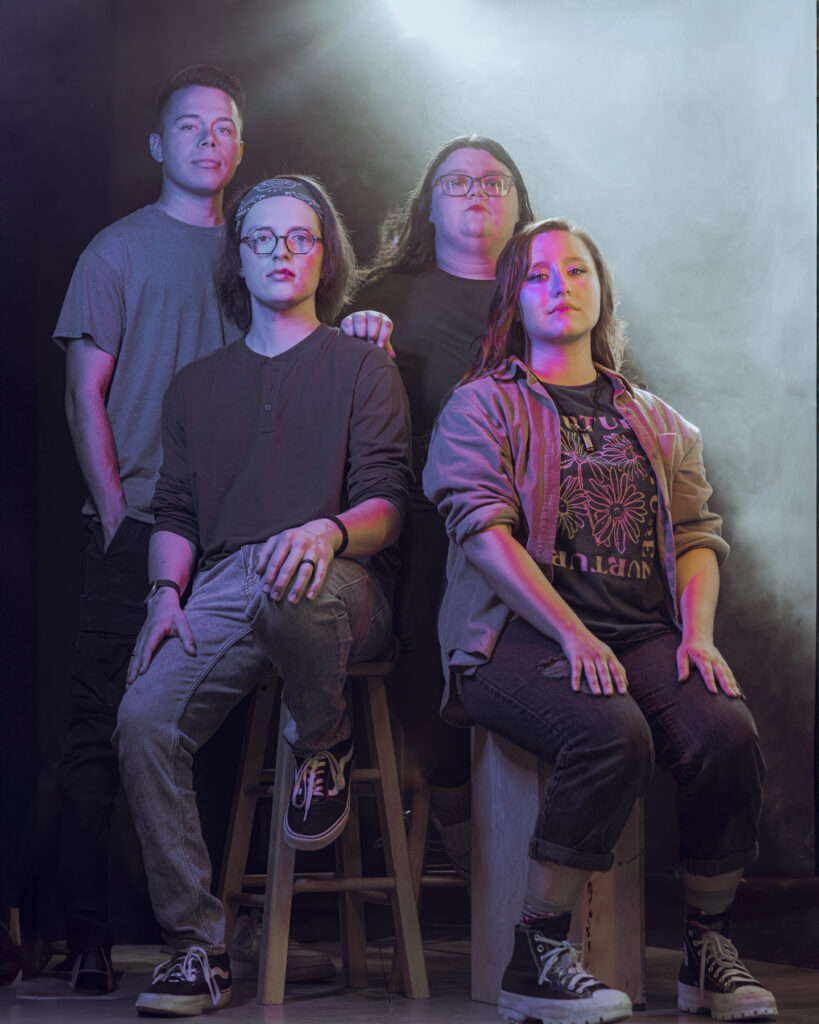A theater play became the impetus of a film, which became the impetus of a production company for four people trying to shine the lights on vulnerable populations: those with depression, those who are LGBTQ+, and more.
The project is the brainchild of Katie, or K., Evans (she/they). Evans graduated in May 2022 with a BFA in theater from Nebraska Wesleyan University. One of her final plays was titled “Dancing with Georgia.”
The work centers on Kasper Hart, a musician who returns to their small hometown on the five-year anniversary of the suicide of their first love. The show also covers sensitive topics such as violence, abortion, and sexual assault.
The resulting script created a controversy among the student body, especially after some of the darker parts of the script were leaked.
Evans said the script was never censured, but at one point, she rewrote part of the piece, as it wasn’t quite right.
“In the original draft, the ending was different than the one that went on stage. That was a choice I made because it was more impactful,” she said.
One actor after another became concerned about the writing, and, in the end, the entire cast changed hands.
“The result ended up being something not quite as bleak as the original script. I think it was overall quite well-received,” said Jay Chipman, Ph.D., professor of communication/theater and theater department chair at Nebraska Wesleyan.
The success of the play was fulfilling to Evans, allowing her to leave college on a high note.
“These dark parts reached people and that was the point,” Evans said. “So, when it was over, a lot of us in the show felt empty in a way.”
Evans found a way to fill the void during a walk around the lake with her friend, and the play’s director, Sydney Nethercot, near graduation. Nethercot asked, “Why don’t you make a movie?” At that point, she realized this story was meant to be bigger, to be seen on screen.
“For me personally, the controversy of the whole thing was difficult,” Evans said. “It made it more important to me, and it made me want to tell it. They were feelings that I had written, and it was dehumanizing for me as a person. I immediately thought, ‘Why don’t we just do it again on film?’”
Evans and fellow actors Cameron James, Jack Liegl, and Cartney McGuigan were available to reprise their stage roles on screen. Isa Luzarraga was brought in to portray Stevie, as the original actor had since moved out-of-state. Nethercot ended up not being part of the film.
It was the crew, however, that became part of the longer-term project known as FourLights Films.
Peyton Savington had been in theater with Evans during her senior year and was brought on as director for that first film. Savington brought in her significant other of three years, Daniel Cole, as production assistant.
The fourth member of the team is Ian Zabel, an actor and friend of Evans. He was brought on as the director of photography. Like Evans and the others, he knew nothing about filmmaking, but dove in headfirst and has discovered a passion for the medium. In fact, the entire group discovered a new creative passion.
“After that movie, we realized we all really liked it,” Evans said. “And so we started with another one. And we just decided it was worth all getting together and trying to figure it out as we went along the way.”
That’s when Evans created FourLights Films. The production company’s mission is to focus on sensitive subjects such as those featured in “Dancing in Georgia.” Their tagline is “No Filter, No Hiding, No Shame.”
Their second feature, “I21,” premiered in late May and has two versions. The plot centers on a young person who is frustrated, but determined, after the disappearance of some close friends on their 21st birthday. In one version, Evans plays the lead role of Isa; in the other version, Cole plays the lead role of Isaac. Two other films are in the works, and a mini-series titled “Jobs of the Afterlife” is available on YouTube and Patreon.
“I’m really excited about that company and the good work that they’re doing,” Chipman said. “It’s a really great example of how something happened in terms of undergraduate education that allowed them to take a great next step in terms of doing professional work.”
To learn more, visit fourlightsfilms.com.
This article originally appeared in the September 2024 issue of Omaha Magazine. To receive the magazine, click here to subscribe.












